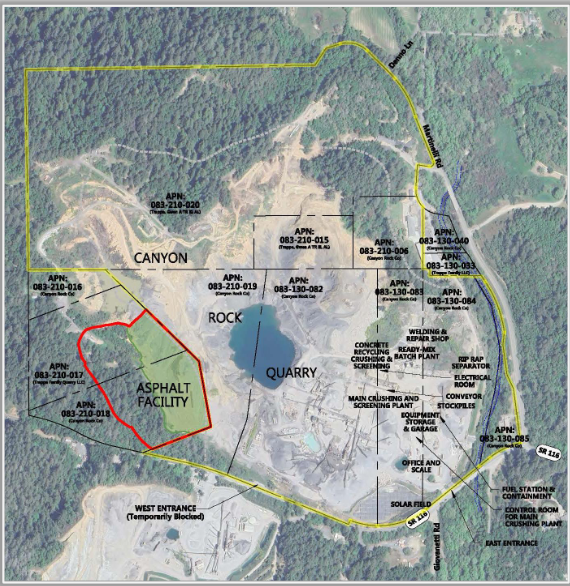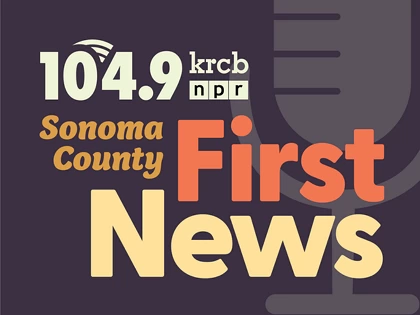 photo credit: Permit Sonoma
photo credit: Permit SonomaAerial map of Canyon Rock's Pocket Canyon Quarry with the proposed asphalt facility location outlined in red.
The trucks start rolling in and out early each morning from the Canyon Rock Quarry on Highway 116, just about a mile west of Forestville’s main drag.
Rock, gravel, or as the industry calls it 'aggregate,' has been coming out of the site since the 1940’s.
Canyon Rock has been owned and operated by the Trappe family since the 1970’s.
Now it's led by brothers Jonathon and James, and the company's next venture, Jonathon said, is asphalt.
"There is a need now in West County," Jonathon Trappe said. "Our customers are asking for something in West County because of the travels going all the way to town just to come back, and driving right past us where the rock came from."
Of Sonoma County's 1,300 miles of county-maintained paved roadway, over 500 miles are in West County.
The idea of an asphalt plant at the quarry has been floated on and off for decades.
As Jonathon Trappe noted, most of what's needed to make asphalt already comes out of Canyon Rock's quarry.
"Asphalt is composed of 95% aggregate, 5% oil," Trappe said.
The plant is closer now to reality than it’s ever been. That's even while it’s still in the planning phases at the county level, on top of regulatory hurdles at the regional, state, and federal level.
Canyon Rock may need to seek approval from seven separate agencies, like the Regional Water Board and Army Corps of Engineers.
Still, Trappe said he’s hopeful the plan will get over the line, and make Canyon Rock the county's third asphalt supplier.
"There's one idle plant in Healdsburg, and then two operating in Santa Rosa and that's it in Sonoma County," Trappe said.
Understandably though, there’s been push back from some in the Forestville community.
Winemaker Darek Trowbridge has vineyards near by the quarry. He said he has a host of concerns.
"What we're finding is just, there's just more questions," Trowbridge said. "We're not finding so many concrete answers at the moment."
Resistance is heating up, and not for the first time.
Trowbridge noted a 2009 lawsuit attempting to block an expansion of the quarry, and says the latest plan has brought the opposition back together, now as the group Russian River Community Cares.
"Is an asphalt plant a good thing to have in a place called Pocket Canyon on the scenic corridor, Highway 116, right near Forestville in a zone that's labeled as an extreme fire danger," Trowbridge said. "Open air, asphalt in trucks, driving by the schools, driving through town."
Trowbridge said besides concerns over fire danger and potential accidents at the plant, he and Russian River Community Cares are concerned about the level of truck traffic on the rural highway. That's in addition to worries about potential impacts to nearby Green Valley Creek, chemical and natural gas storage at the site, potential impacts to nearby property values, and insurance rates.
Trowbridge also questions if it's the right place for an asphalt plant with 75-foot-tall silos.
"You know, we've got outdoor eating out there, you know, this is food and wine country and I don't enjoy the smell of asphalt while I'm consuming food," Trowbridge said. "Is that gonna be a big issue? I don't know, but it certainly seems like it could be an issue."
Trappe said Canyon Rock is all ears for community feedback, the company has a website dedicated to the project, outlining what they say will and won't change if the plant is built. It includes visual impacts from the potential future silos when viewed from the road, which Trappe pointed out on a tour of the quarry.
"Yeah, they're right around 70 feet," Trappe said. "But the way the road is and the berm is, your elevations, you just get that natural tiny little peak at the top...and as the trees grow...it'll pretty much, you won't be able to see it."
"What we're doing, and our goal is as we go north," Trappe said. "Is we'll leave a buffer to the east and a buffer to the west. So we're kind of going between two ridge lines."
Trappe said the company is committed to building an efficient, safe facility, with as low an emissions foot print as possible.
"We have batteries here," Trappe said. "We have a megawatt of batteries, we have solar. We're looking to add more solar and that's where we're trying to use green energy, where we can, you know, we're actually a Sonoma Clean Power customer."
The Canyon Rock Asphalt Plant proposal is currently awaiting environmental documents from Permit Sonoma, in the works since last fall, and expected sometime in late 2025, according to the permitting agency.
Further on the horizon for the Trappe's and Canyon Rock is the future of the company's Pocket Canyon quarry itself. Permits for the site expire in 2038.

 Live Radio
Live Radio




